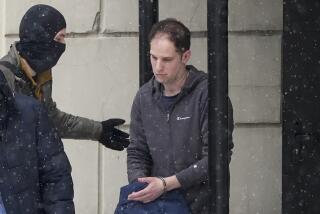Ex-oil baron Mikhail Khodorkovsky back in court
- Share via
MOSCOW — Like a forgotten ghost blown into town on a blast of Siberian wind, fallen oil baron Mikhail Khodorkovsky appeared in a Moscow courtroom Tuesday to answer new charges of embezzlement and money laundering.
Once the wealthiest man in Russia, Khodorkovsky has served about half of an eight-year sentence at a Siberian prison camp near the Chinese border. His former company, the once-massive Yukos oil, was dismantled and sold at auction. If he is found guilty of the second set of charges, which date from the days before his arrest, the onetime magnate could face up to 22 more years in prison.
The new trial revisits a saga that began in different times. When Khodorkovsky was arrested in 2003 for tax evasion and fraud, then-President Vladimir Putin was still consolidating his rule and shutting down the opposition, greasing his way to popularity with budgetary riches from a seemingly endless oil and gas boom. The imprisonment of Khodorkovsky, now 45, sent into oblivion a young entrepreneur who’d started to speak out against the Kremlin and funnel money to opposition parties. With the oil baron behind bars and his vast company destroyed, state control over natural resources was redoubled.
Khodorkovsky’s supporters predict his return to court will prove how little Russia has changed since then. With the end of Khodorkovsky’s prison sentence getting closer, and with a sinking economy creating new political uncertainty, the government couldn’t risk the release of an outspoken opposition figure, they say.
“I feel it’s impossible to overcome, that he’ll be inevitably convicted,” said Karinna Moskalenko, one of Khodorkovsky’s lawyers. “They are afraid of him. They don’t want him to be free.”
As Tuesday’s hearing began, dozens of riot police ringed the courthouse and sealed off surrounding streets, demanding to see identity papers of anybody drawing close to the building. A handful of demonstrators broke into cries of “Freedom for political prisoners!” and were promptly hauled off by police.
Dressed casually in jeans and a fleece pullover, Khodorkovsky smiled and laughed inside the courtroom’s glass cage as his lawyers accused the prosecutors of bias. He appeared little changed by the years behind bars, which have cemented his stature as an emblem of the ruthless power plays and spotty rule of law that have characterized Putin’s rise. Analysts say the spectacle of his ruination taught Russians that petrodollars were no protection; that no matter how rich you got, you meddled in politics at your own peril.
“The message was very well taken,” said Maria Lipman, an analyst at the Carnegie Moscow Center. “No businessman in his right mind would sponsor anything that even smacks of politics without a nod from the Kremlin. Russian business is totally submissive.”
Still, some observers regard the new trial as a referendum on whether Russia has evolved since Putin handed over the presidency to his handpicked successor, Dmitry Medvedev. They point out that Medvedev, himself a lawyer, has lashed out at Russia’s “legal nihilism” -- the court manipulations and corruption that many observers believe were exemplified by Khodorkovsky’s first trial.
But others note that, aside from a few minor flourishes, Medvedev has so far done little to distinguish himself from his mentor. This trial is nothing but a continuation of the first, they say -- and its purpose is to keep an old Kremlin enemy behind bars as long as possible.
Sergei Markov, a political analyst and lawmaker for the ruling United Russia party who is close to the Kremlin, disagrees with both views. Khodorkovsky has been defanged, he argues, to the degree that Russia’s leaders no longer care whether he gets out of prison.
“The political goal of Khodorkovsky was to get power,” Markov said. “Even if he will come back to the political life, he couldn’t be a problem without huge money. The problem before was that he had huge, huge, huge money.”
In a petition submitted to the investigative committee, Khodorkovsky’s lawyers complained that investigators and prosecutors had tainted the case to the point that a fair trial was inherently impossible.
The petition accuses Putin, now Russia’s prime minister, of controlling the prosecution of Khodorkovsky and his former partner, Platon Lebedev, “to take away property from them, to rule out the possibility of its return and to force them to fall silent.”
The petition includes a statement from former Yukos executive Vasily Aleksanian, who reportedly suffers from AIDS. Aleksanian accuses investigators of withholding medical treatment in an effort to pressure him to testify against Khodorkovsky and Lebedev.
“This is torture, you understand,” reads the statement from Aleksanian. “They need to be able to put on a real show trial.”
Khodorkovsky was a self-made businessman who, by some accounts, was not shy about cutting corners and playing dirty to build his empire. In other words, little different from other Russian “oligarchs,” with one key exception -- Khodorkovsky became politically active.
In prison, Khodorkovsky was slashed in the face by a cellmate, though no scar was apparent Tuesday. The same cellmate later accused Khodorkovsky of sexual harassment in what his supporters say was a government-backed attempt to smear the former oil executive’s reputation.
Meanwhile, Khodorkovsky was reportedly punished for skipping a prison sewing class and possessing literature about prisoners’ rights. His requests for parole were denied. But he continued to write, producing a manifesto on liberalism in Russia as well as a wide-ranging interview with Esquire magazine.
The interview also landed Khodorkovsky in trouble.
“I am convinced that the struggle with corruption in Russia -- this is a struggle for democracy,” Khodorkovsky wrote in Esquire. “It is precisely for this reason that an independent, uncorrupted judiciary is the question of questions for modern-day Russia.”
--
Times staff writer Sergei L. Loiko contributed to this report.
More to Read
Sign up for Essential California
The most important California stories and recommendations in your inbox every morning.
You may occasionally receive promotional content from the Los Angeles Times.













